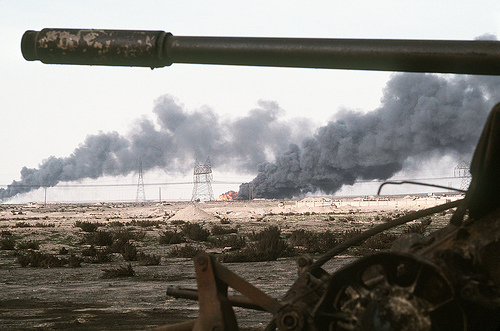Terrors of the Liberal Night
As the US Presidential election enters its final tense weeks, liberals are becoming increasingly agitated in their dreams, with a rising number of nightmares featuring aggressive attacks by President Bush, Vice-President Cheney, and hordes of zombie Republicans.
That is the initial finding of Dr. Kelly Bulkeley, a dream researcher at the Graduate Theological Union and John F. Kennedy University, both in the San Francisco Bay Area. Dr. Bulkeley has been studying the connection between dreams and US Presidential elections since 1992, and this year he has found that people on the left side of the political spectrum are having a surprising number of bad dreams about the election:
From a 57-year old man in a Western swing state, where the political advertising barrage is inescapable: “The dream seemed to have lasted all night long. There were thousands and thousands of photographic images of Bush like a montage of photo ops. They were all remarkably bland and dull. Many of the photos had a caption attaching saying things like “George Bush is President, isn’t he?” “Yup!” They were all very insipid and bland.”
From a 43-year old man in California: “At first I talk with President Bush, and think he’s a friendly guy. But then I’m part of some meal ritual with a bunch of his followers. Bush makes me eat disgusting food, meat, mustard. I do it, though it’ll make me sick, to prove I’m tough.”
From a 22-year old college student, a liberal woman at a predominantly conservative school in a Midwest swing state: “I’ve got to catch a flight, so I enter the airport and walk down a long, downhill hallway. I enter into a cave/tunnel that is very dark. I see bloody people everywhere (lots of bright red zombie-like people) and lots of people in blue who are clean and pure-looking. I don’t want to be rude, so I don’t comment or ask why this is. I come out of the tunnel into light, and am in some kind of theme-park. Tons more people in bloody red or blue are all around. A blue person grabs me and says she is trying to protect me from the red. I see that she has the Kerry/Edwards logo on, and this is what all the blue people support. All the reds are Bush supporters. They all look like zombies, and I see them attacking people. I hop onto the Kerry Campaign trail-literally. It is a long line of connected wooden boats. I climb from the back car towards the front. I find Edwards on one boat, and Kerry is in the front boat. I feel safe, but there is a huge disruption of some kind and I find myself alone again with all of the zombie Bush supporters pulling me in every direction and trying to feed me some kind of processed meats from their barbecue (sausage/hot dog looking things). I don’t trust this meat and find that it is human flesh from the Kerry supporters. I try to get away and am suddenly falling down a huge waterfall or waterslide with zombies grabbing me. I wash into the dark tunnel again, and that’s when I woke up.” (As pointed out by the dreamer, the red and blue colors match the “red state, blue state” division of the electoral map.)
From a 35-year old woman from New York City: “I’m driving through the Bush ranch in Crawford, where I pass a pen in which a couple of impossibly obese dogs snap and growl at each other, fighting over something I can’t see. At a small pond nearby, a duck swims up to me and hops into my hands, resting for a moment before it returns to the water. I’m pleased in that way most people feel when a wild animal eats out of your hand or offers some similar display of trust. As it swims away I notice drops of blood on my hands, and then realize that the fracas in the dog pen is over ducks that are being tossed in there for no reason other than pure sadism. I feel ashamed that I had simply enjoyed holding the duck without realizing that it was looking to me for rescue.” The woman said she felt the dream reflects “my very real concerns about the beating that the weak and helpless are getting under this administration,” and she credits the dream’s emotional power with giving her the motivation to do something socially constructive—“In fact, the dream led me to take up a weekly volunteer gig at a charity for the homeless.”
From a 34-year old woman in Pennsylvania: “The closer we get to this upcoming election, the less able I am to sleep because of the nightmares I’ve been having. They range in topic from a multi-city nuclear attack on the US on election day (though not in my city), which scares voters into staying home and therefore allowing a Bush re-election; horrible things that happen to the people I love after Bush wins re-election (people lose jobs or houses, die of diseases because they don’t have healthcare, starve to death or become homeless); futuristic dreams where humanity and the environment are in shambles and historians point to George W. Bush and this election as the catalyst; terrorists manage to take over the whole US on election day and I and my family get kidnapped, tortured, shot because I’m an elected official {in waking life]; a situation where Kerry wins the election but Bush & Co. play some sort of dirty trick to ensure his illegal re-election, and riots and other dangers ensue and I’m unable to protect all 3 of my kids, get separated from my husband, we have no food and have to eat the dog or starve, we are driven from our home by people with guns (when we own none because we are pacifists).”
Uncertainties, and Support
Other dreams reported by liberal Democrats include nagging uncertainties about their own party’s Presidential candidate. For example, a 63-year old California woman who was a primary supporter of John Edwards dreamed that the “Kerry/Edwards” button on her purse was changed to “Edwards/Edwards.” A 52-year old Massachusetts man who detests Bush but isn’t sure Kerry is progressive enough for him dreamed that he tried to go to the Democratic convention in Boston, but couldn’t find a parking place. Still, a few liberals have had positive dreams expressing support for John Kerry. A particularly explicit dream of this type comes from a 77-year old man from a Midwest swing state who dreamed he let Kerry stand on his shoulders so the Democratic candidate could speak to a bigger audience at a political rally.
Conservative Dreams
What of conservative people’s dreams? Fewer conservatives than liberals have reported election-related dreams. There are several possible reasons for this: 1) the research requests are not reaching enough conservative audiences; 2) conservatives from certain Christian traditions dismiss all dreams as demonic temptations; 3) conservatives may indeed be having election-related dreams, but are reluctant to share the dreams with a stranger; 4) conservatives are simply having fewer election-related dreams to report.
The dreams of conservatives combine positive feelings of support with lingering anxieties about the President. Here are two examples.
A 23-year old Republican woman from Pennsylvania dreamed this: I was at the White House, and for some reason there were a bunch of Rotweiller dogs being put to sleep for being too dangerous. The lady that was administering the shot was just about to inject the last dog when President Bush came downstairs to take his dog out. I asked if I could talk to him, and he said sure. I walked with him outside and told him how upset I was about the dogs being put to sleep. We were alone on the lawn, and I asked him why there was no security outside, and he just shrugged his shoulders and smiled. He told me I could have the last dog if I wanted it. We went back inside and the President grabbed the shot of out of the ladies’ hand and there was a brief struggle. The dog came running over to me and was wagging its tail, and I was so excited to be taking it home. I remember looking at the dog and seeing the colors of his fur (black with brown spots) and also when walking with the President, I saw the color of his jacket (green). The dreamer, who has worked for the Bush campaign, said the dream accurately reflects her feelings about the “good things” the President has done in office, with Bush himself appearing as a “down-to-earth guy” whom she can trust in sharing her fears.
A 30-year old woman from North Carolina had the following dream: “I am one of 3 daughters of the President (I am assuming it was Bush, the current President). We are in route to board a plane, outside at night, walking in a straight line at a slow pace. I am at the very front, my two sisters on either side, our arms locked (I have 2 sisters in our immediate/first family, I happen to be the middle). We are leading a huge entourage with the President behind us, his secret service detail surrounding him. The plane is also behind us, I can hear its engine and see the lights they are projecting past us. We are moving towards the tarmac to board. I feel like we need to stay in a close knit group, we also can’t look behind to make sure everyone is still there. Suddenly, the lights fade, the engines die down and the sounds of the people are gone. It is just the three daughters. We learn the plane will not leave from this airport, we have to travel to Atlanta to get on it. Atlanta is a few states away, the rest of the group had left for there. We are broken from the group, vulnerable, left to find our own way to Atlanta, on foot.” The dreamer is a registered Republican and a strong supporter of President Bush’s reelection, and while the dream offers a clear image of her support, it also suggests her concern about the dangerous “single-mindedness” of the President—“not able to look behind and see what is going on, not able to see the support, just going on faith.”
Prophecies
Anyone who wants to make a prediction about the election on Tuesday has dream material to work with from both sides. As noted, liberals are plagued with nightmarish anticipations of Bush being reelected, while at least a few conservatives foresee a Kerry victory in their dreams. For example, a Bush-supporting 28-year old woman from North Carolina had this dream twice within a week in mid-October: “I had a dream that Bush lost. It was actually set up like, a newspaper article I was reading. I was reading that Bush only served one 4 year term. (which would lead me to believe he didn’t win) Then I was trying to see who was the new president, but I couldn’t find the name, I assumed it was Kerry but something told me maybe it isn’t.” Perhaps the Biblical tradition that doubling a dream signals its prophetic truth (Gen. 41:32) enhances the credibility of this woman’s dreams, at least from a conservative Christian perspective.
Only one dream could be described as a wholly positive prophecy, from a 42-year old Pennsylvania woman who favors Kerry: “In the dream I was napping on the sofa while my daughter watched TV to see who was winning the election. Suddenly I awoke [in the dream] to lots of cheering and triumphant sounding music. I asked, “Who won? Did someone win?” My daughter just sat and smiled at me. Again I asked her, “Who won, who won? Did Kerry win?” Finally she answered me with, “YES!!!!”. We were overjoyed and started calling friends to make sure everyone knew.”
Future Research
Dr. Bulkeley is working on a larger-scale project examining the broader question of whether liberals and conservatives have fundamentally different kinds of dreams. Using detailed interviews with people from both political ideologies, this project will provide the first empirical findings on such topics as who has the most dream recall, who suffers nightmares most frequently, who has more sexuality in their dreams, who dreams most often about work and money, who flies in their dreams the most, etc. The answers to these questions (which will be presented at the annual conference of the International Association for the Study of Dreams, June 24-28, Berkeley, California) promise to shed a new and perhaps amusing light on the unconscious psychological roots of our country’s bitterly divided political landscape.



